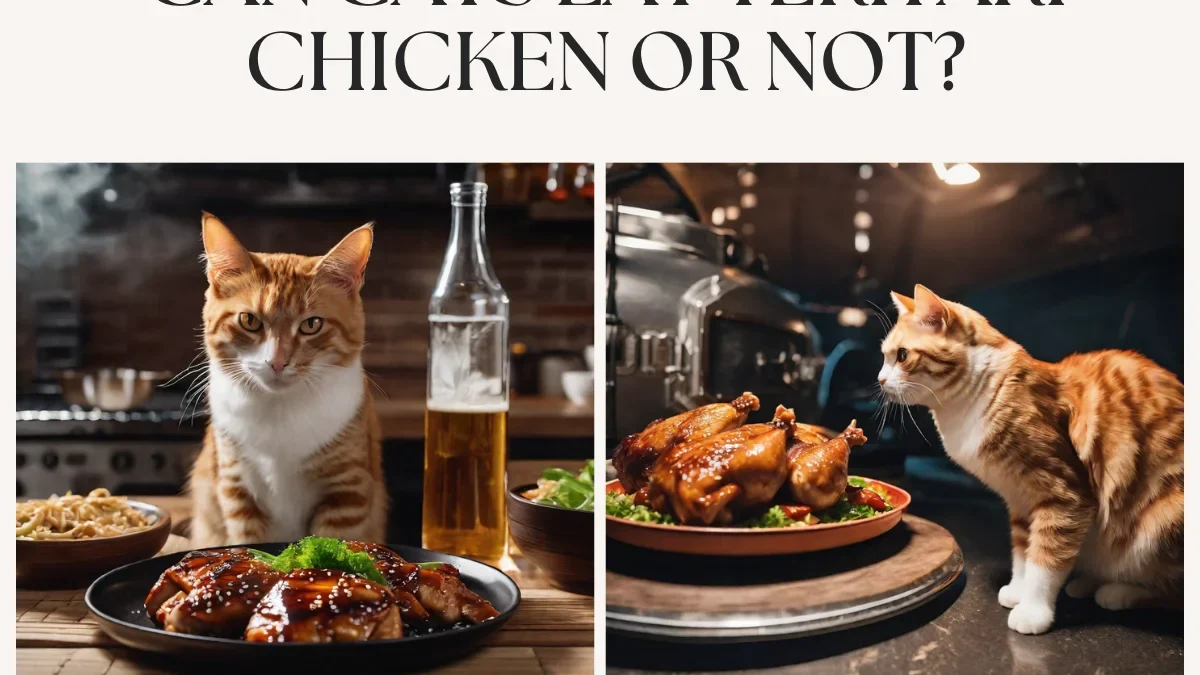As cat owners, we often find ourselves wondering about the foods we can and cannot feed our feline companions. One popular dish that may have caught your attention is teriyaki chicken. This savory and delicious dish is a staple in many households, but can cats eat teriyaki chicken? The answer may not be as straightforward as you think. In this ultimate guide, we will delve into the potential risks and benefits of feeding teriyaki chicken to your cat and ultimately answer the question – can cats eat teriyaki chicken? Let’s dig in and find out!
Table of Contents
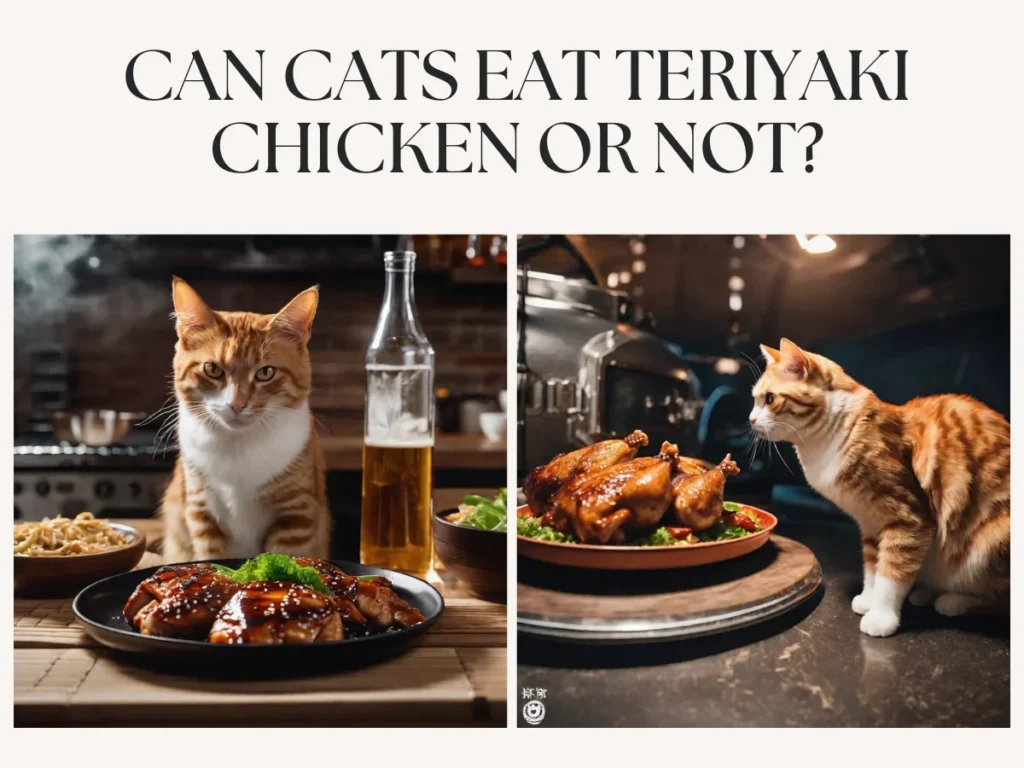
Understanding the Cat’s Dietary Needs
When it comes to understanding a cat’s dietary needs, it’s important to remember that cats are obligate carnivores. Unlike omnivores, who can thrive on a diet that includes both plants and animals, cats have evolved to primarily eat meat. Their bodies are designed to metabolize animal proteins and derive essential nutrients from them.
Cats have specific nutritional requirements that are crucial for their overall health and well-being. They need high-quality proteins, such as those found in meat, to provide them with essential amino acids. These amino acids are vital for the growth and repair of their muscles, organs, and tissues.
In addition to protein, cats also require certain vitamins and minerals in their diet. These include vitamin A, taurine, arachidonic acid, and several B vitamins. Taurine, in particular, is essential for a cat’s heart health and vision. Without an adequate intake of taurine, cats can develop serious health issues, including heart disease and vision problems.
While cats require a high-protein diet, it’s important to note that they also need a moderate amount of fat in their diet. Fats provide cats with a concentrated source of energy and are necessary for the absorption of fat-soluble vitamins. However, it’s crucial to provide cats with healthy fats, such as those found in fish and poultry, rather than unhealthy fats like those found in processed foods.
Understanding a cat’s dietary needs is the first step in providing them with a healthy and balanced diet. By ensuring they receive the proper nutrients, we can help support their overall health and well-being.
What is Teriyaki Chicken and Its Ingredients?
Teriyaki chicken is a popular Japanese dish that consists of chicken marinated in a sweet and savory sauce. The sauce typically contains soy sauce, mirin (a type of rice wine), sugar, ginger, and garlic. It is then grilled or broiled until the chicken is tender and flavorful.
While teriyaki chicken may be a delicious and tempting dish for us humans, it’s important to consider whether it is safe for our feline friends. Cats have specific dietary needs, as mentioned earlier, and not all human foods are suitable for them.
When it comes to teriyaki chicken, there are a few factors to consider. First, the sauce used in teriyaki chicken contains ingredients that may not be ideal for cats. Soy sauce, for example, is high in sodium, which can be harmful to cats in large amounts. Additionally, the sugar content in the sauce may not be suitable for cats, as their bodies are not designed to process high amounts of sugar.
Furthermore, the marinade often includes garlic and ginger, which can be toxic to cats in large quantities. While a small amount of these ingredients is unlikely to cause harm, it’s important to consider the potential risks.
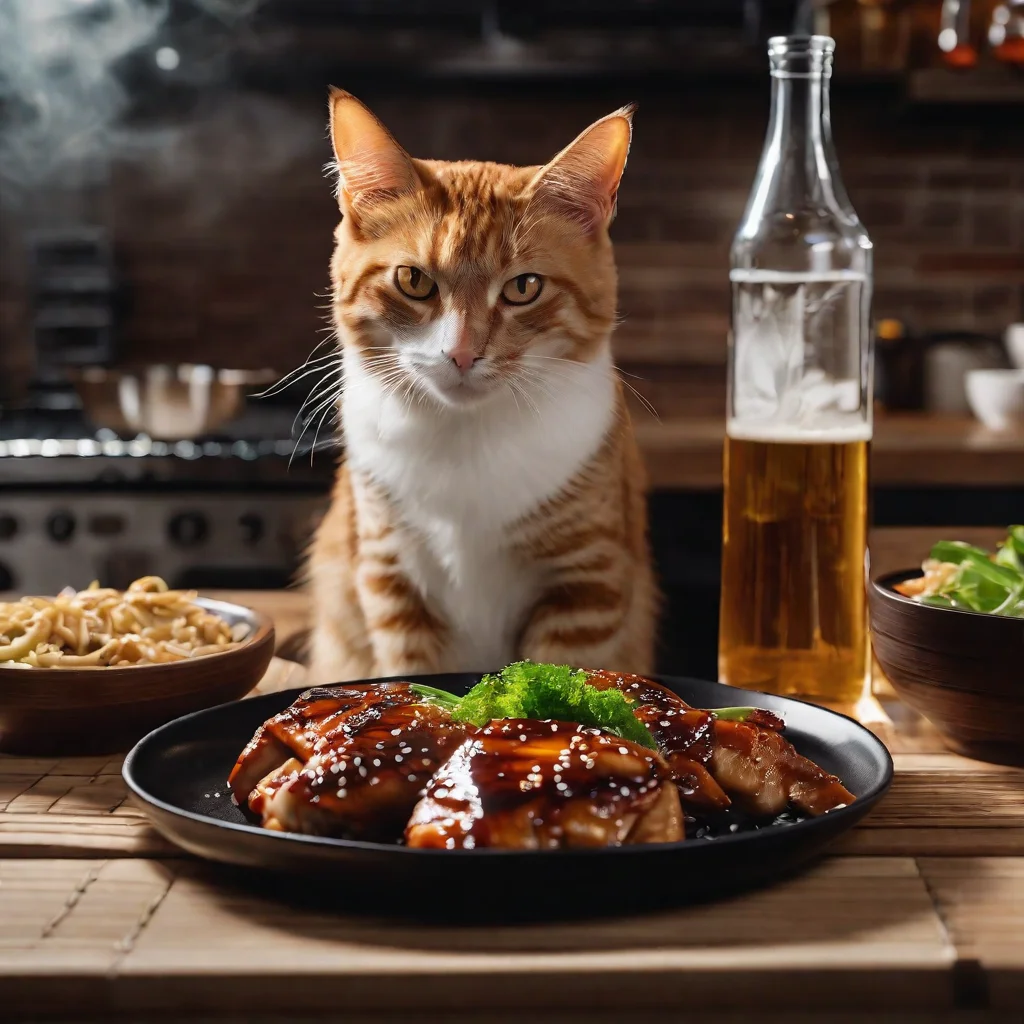
Potential Hazards of Feeding Cats Teriyaki Chicken
When it comes to feeding teriyaki chicken to your cat, there are several potential hazards that you need to be aware of. One of the main concerns is the high sodium content in soy sauce, which is a common ingredient in teriyaki sauce. Cats have a much lower tolerance for sodium compared to humans, and excessive intake can lead to health problems such as dehydration, high blood pressure, and kidney issues.
Another hazard to consider is the sugar content in teriyaki sauce. Cats are not designed to process high amounts of sugar, and too much sugar can lead to obesity, diabetes, and dental problems in felines.
The inclusion of garlic and ginger in the marinade is also a cause for concern. While small amounts of these ingredients are unlikely to cause harm, larger quantities can be toxic to cats. Garlic and ginger can damage a cat’s red blood cells, leading to anemia and other serious health complications.
Additionally, teriyaki chicken is often prepared using cooking methods that may not be suitable for cats. Grilling or broiling can result in charred or burnt pieces of chicken, which can be carcinogenic to cats when consumed regularly.
Overall, while teriyaki chicken may be a tasty treat for humans, it poses several potential hazards to our feline friends. It’s best to err on the side of caution and avoid feeding them this dish altogether. Instead, opt for cat-friendly alternatives that are specifically formulated to meet their nutritional needs. Your veterinarian can provide guidance on the best diet for your cat and help ensure they receive all the nutrients they need for optimal health and well-being.
The Verdict – Can Cats Eat Teriyaki Chicken Safely?
So, after diving into the potential risks and benefits of feeding teriyaki chicken to your cat, it’s time to address the burning question – can cats eat teriyaki chicken safely? The verdict is…it’s best to avoid feeding your feline friend teriyaki chicken altogether.
While teriyaki chicken may be a delicious and tempting dish for us humans, it poses several potential hazards to our cats. The high sodium content in soy sauce, along with the sugar and garlic in the sauce, can lead to health problems such as dehydration, high blood pressure, kidney issues, obesity, diabetes, and dental problems in cats. Additionally, grilling or broiling methods can produce carcinogenic burnt pieces of chicken that are not suitable for our furry companions.
Instead of taking risks with teriyaki chicken, it’s important to provide your cat with healthy alternatives that are specifically formulated to meet their nutritional needs. Consult with your veterinarian to determine the best diet for your cat and ensure they receive all the essential nutrients they need for optimal health and well-being.
Remember, as responsible cat owners, it’s our duty to prioritize our feline friends’ health and safety. So, resist the temptation to share teriyaki chicken with your cat and opt for cat-friendly alternatives instead. Your cat will thank you for it!
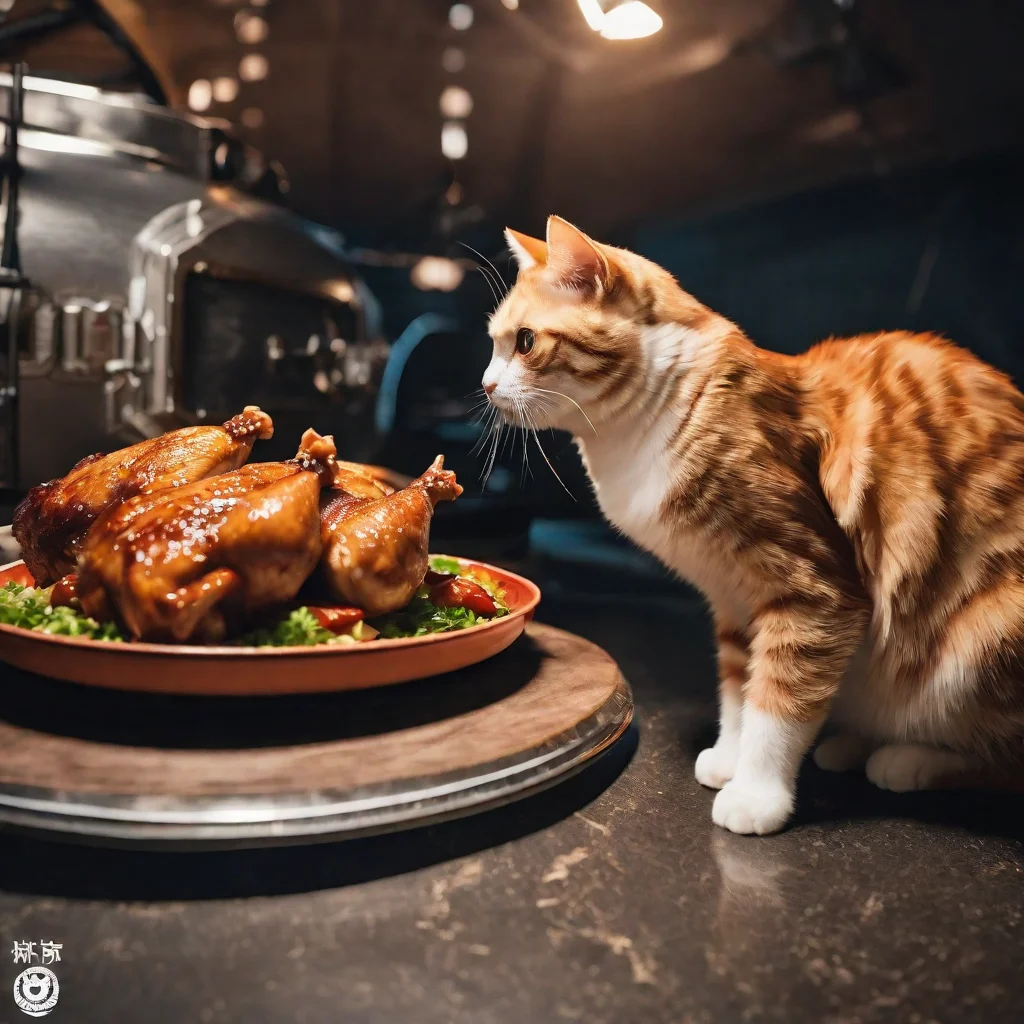
Healthy Alternatives to Teriyaki Chicken for Your Cat
If you’re looking for healthy alternatives to teriyaki chicken that are safe for your cat, there are a few options to consider. Remember, it’s important to choose foods that meet your cat’s nutritional needs and are free from harmful ingredients.
One great option is plain, cooked chicken. You can simply boil or bake some chicken breast without any seasonings or sauces. This provides a lean source of protein for your cat and can be a tasty treat. Just make sure to remove any bones before serving it to your feline friend.
Another alternative is cooked fish. Fish such as salmon, tuna, or trout can be a great source of protein and healthy fats for your cat. However, it’s important to cook the fish thoroughly and remove any skin, bones, or seasonings that may be harmful to your cat.
If you’re looking for a more convenient option, there are commercially available cat-friendly foods that mimic the flavors of teriyaki chicken. These products are specifically formulated to meet your cat’s dietary needs and are a safe and healthy alternative.
Lastly, you can consider making your own homemade cat treats using cat-safe ingredients. There are plenty of recipes available online that provide step-by-step instructions on how to make delicious and nutritious treats for your cat.
Remember, when introducing new foods to your cat’s diet, it’s important to do so gradually to avoid any digestive issues. Always consult with your veterinarian before making any changes to your cat’s diet to ensure they are receiving the proper nutrients and staying healthy.
What to Do if Your Cat Ingests Teriyaki Chicken
If you find yourself in a situation where your cat has ingested teriyaki chicken, there are a few steps you should take to ensure their safety and well-being. First and foremost, remain calm. While teriyaki chicken may not be ideal for cats, a small amount is unlikely to cause immediate harm.
The first thing you should do is assess the situation. Determine how much teriyaki chicken your cat has consumed and whether or not it included any bones or large chunks. If your cat has ingested a large amount or if there are bones present, it’s crucial to contact your veterinarian immediately. They can provide guidance on what steps to take next and whether or not your cat needs medical attention.
If your cat has only eaten a small amount of teriyaki chicken and there are no bones involved, you can monitor them closely for any signs of discomfort or illness. Keep an eye out for symptoms such as vomiting, diarrhea, lethargy, or loss of appetite. If any of these symptoms occur, contact your veterinarian right away.
In the meantime, it’s important to encourage your cat to drink plenty of water. This can help dilute any potentially harmful substances and aid in digestion. You may also consider feeding them a small amount of their regular cat food to help settle their stomach.
While it can be tempting to induce vomiting in your cat, it’s best to leave that decision to your veterinarian. They can determine if it is necessary and guide you on how to do it safely.
Remember, the best course of action is to prevent your cat from ingesting teriyaki chicken in the first place. Keep human food out of their reach and provide them with a balanced and nutritious cat-friendly diet.
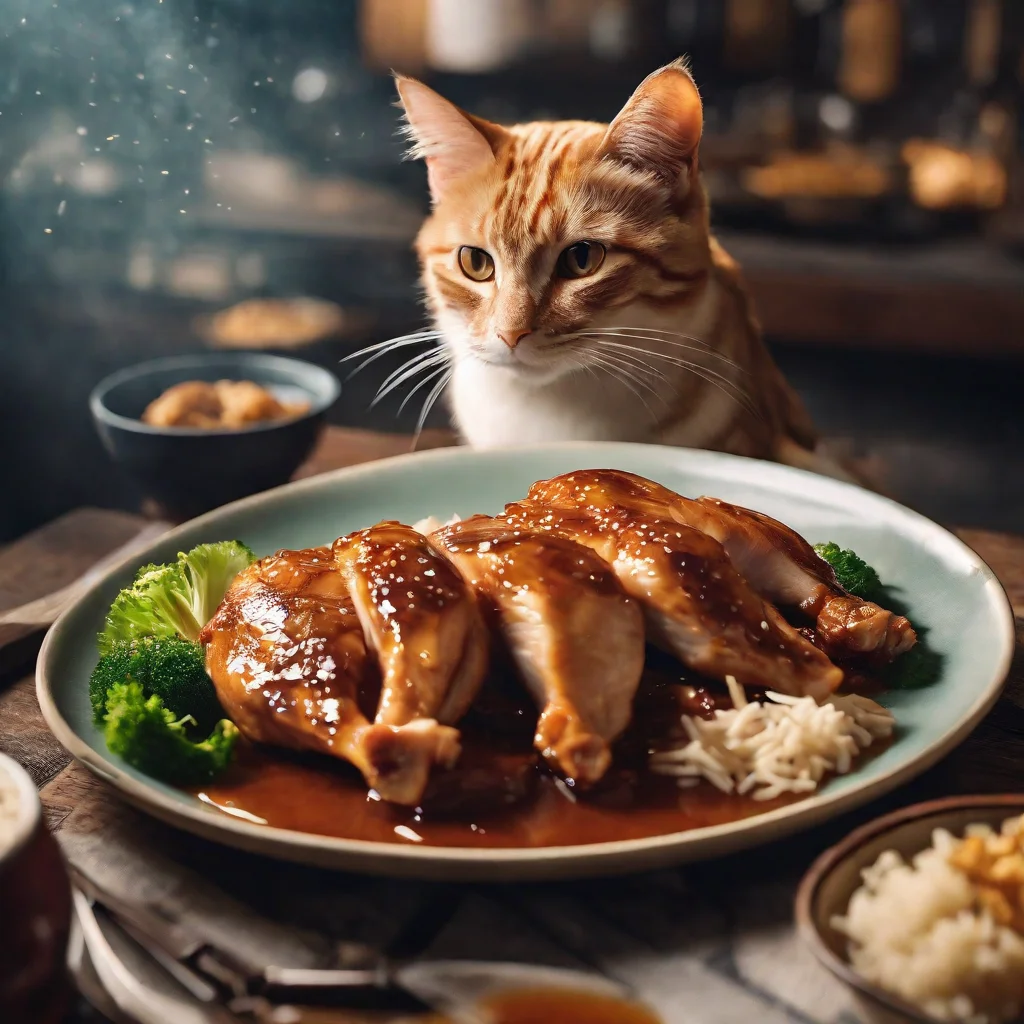
Cat-Safe Protein Sources for Your Feline Friend
As cat owners, we know how important it is to provide our feline friends with a diet that meets their nutritional needs. When it comes to protein sources, it’s essential to choose options that are safe and beneficial for our cats. So, what are some cat-safe protein sources that you can offer to your feline friend?
One excellent protein source for cats is plain, cooked chicken. Chicken is a lean meat that provides essential amino acids for your cat’s muscle growth and repair. It’s important to cook the chicken thoroughly and remove any bones before serving it to your cat, as bones can be a choking hazard. You can boil or bake the chicken without any seasonings or sauces, ensuring that it is a healthy and safe option.
Another protein source that cats enjoy is fish. Cooked fish, such as salmon, tuna, or trout, can provide your cat with omega-3 fatty acids and other beneficial nutrients. It’s important to cook the fish thoroughly and remove any skin, bones, or seasonings that may be harmful to your cat. Fish can be a tasty and nutritious addition to your cat’s diet, but it should be given in moderation to avoid any potential mercury contamination.
If you prefer the convenience of commercial cat food, there are plenty of options available that are formulated to meet your cat’s dietary needs. Look for high-quality cat food brands that prioritize protein sources such as chicken, fish, or turkey. These foods are specially designed to provide the right balance of nutrients for your cat’s overall health and well-being.
Lastly, you can consider making your own homemade cat treats using cat-safe ingredients. There are plenty of recipes available online that provide step-by-step instructions on how to make delicious and nutritious treats for your cat. These treats can be a fun way to bond with your furry friend and provide them with additional protein in their diet.
When introducing new protein sources to your cat’s diet, it’s important to do so gradually to avoid any digestive issues. Monitor your cat’s reaction to the new food and consult with your veterinarian if you have any concerns. Remember, a balanced and varied diet is essential for your cat’s overall health, so be sure to provide them with a variety of protein sources to keep them happy and healthy.
Exploring the Risks of Giving Cats Spicy Foods
While the thought of sharing a spicy meal with your cat might seem tempting, it’s important to understand the potential risks involved. Cats have a different tolerance for spice than humans do, and their bodies are not equipped to handle the heat in the same way.
One of the main risks of giving cats spicy foods is the potential for gastrointestinal upset. Spices like chili powder, cayenne pepper, or hot sauce can irritate your cat’s digestive system and cause symptoms such as vomiting, diarrhea, or stomach pain. This can be particularly concerning if your cat has a sensitive stomach or a history of gastrointestinal issues.
Additionally, spicy foods can also cause oral discomfort for cats. The heat from the spices can irritate their mouth and throat, making it difficult for them to eat or drink comfortably. This can lead to a decreased appetite and potentially even dehydration if your cat avoids food and water due to the discomfort.
Furthermore, some spices can have toxic effects on cats. Ingredients like onions, garlic, and certain peppers can be harmful or even toxic to cats in large quantities. These substances can cause damage to a cat’s red blood cells or disrupt their digestive system, leading to serious health complications.
To ensure the health and well-being of your feline friend, it’s best to avoid giving them spicy foods altogether. Stick to cat-friendly treats and foods that are specifically formulated to meet their nutritional needs. If you have any concerns or questions about your cat’s diet, consult with your veterinarian for personalized advice.
Remember, cats have delicate digestive systems and unique dietary requirements. By providing them with a balanced and appropriate diet, you can help keep them happy, healthy, and spice-free!
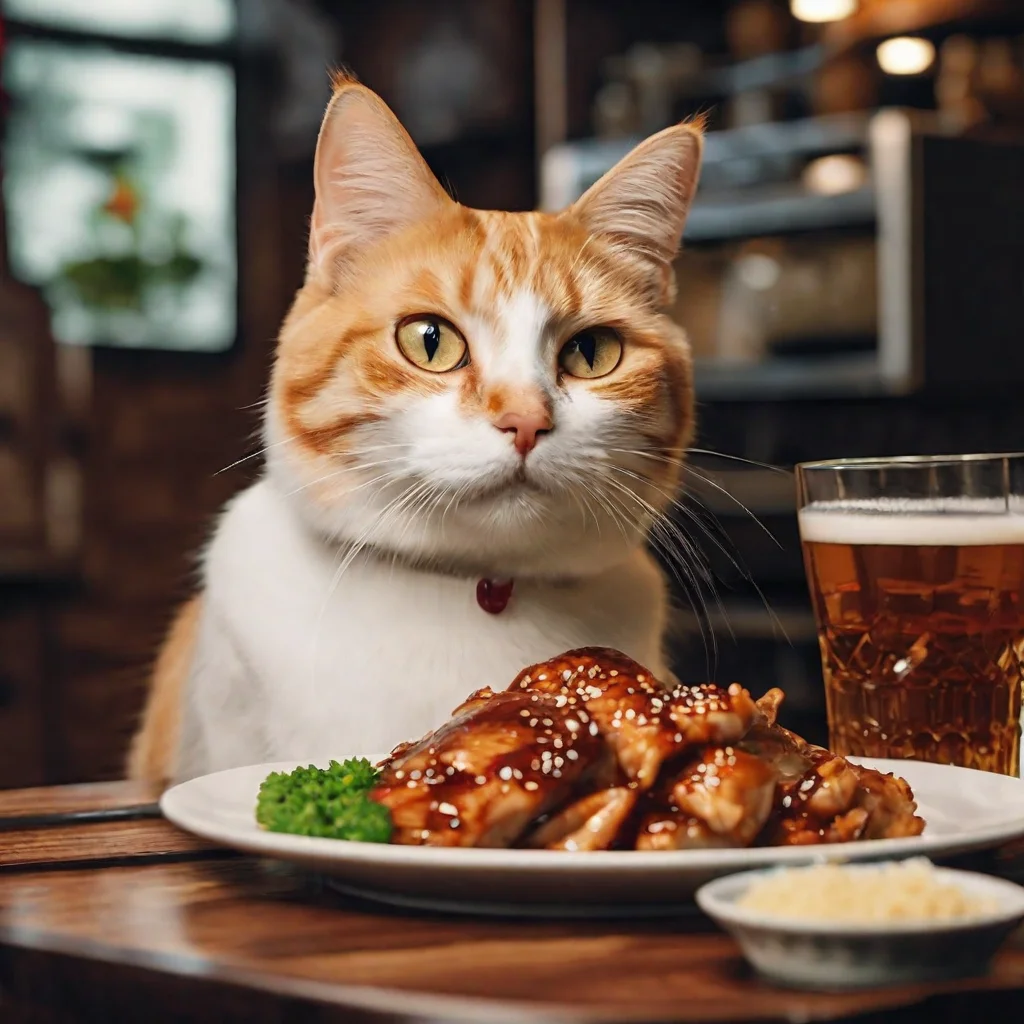
The Benefits of a Balanced Diet for Your Cat
Feeding your cat a balanced diet is essential for their overall health and well-being. Providing them with the right nutrients in the right proportions can help prevent a range of health issues and ensure they lead a long and happy life. Here are some benefits of a balanced diet for your cat.
- Weight management: A balanced diet helps maintain your cat’s weight at a healthy level. Obesity in cats can lead to various health problems, such as diabetes, arthritis, and heart disease. By providing them with a diet that is nutritionally balanced and portion-controlled, you can help prevent weight gain and promote a healthy body condition.
- Optimal growth and development: Kittens have different nutritional needs than adult cats. A balanced diet for kittens should contain higher levels of certain nutrients, such as protein and calcium, to support their growth and development. Providing them with the right nutrients during their formative years can help them reach their full potential and lay a foundation for good health throughout their life.
- Strong immune system: A balanced diet rich in essential vitamins, minerals, and antioxidants can boost your cat’s immune system. This helps their body fight off infections and diseases, ensuring they stay healthy and resilient.
- Healthy skin and coat: The quality of your cat’s diet can significantly impact the condition of their skin and coat. A balanced diet that includes essential fatty acids, such as omega-3 and omega-6, can promote healthy skin and a glossy coat. It can also help reduce shedding and minimize skin irritations.
- Dental health: Feeding your cat a balanced diet that includes dry kibble or specially formulated dental treats can help promote good oral health. The texture of these foods can help remove plaque and tartar buildup, reducing the risk of gum disease and dental issues.
- Improved digestion: A balanced diet that includes high-quality proteins, fiber, and prebiotics can promote a healthy digestive system. It can help prevent issues like constipation, diarrhea, and vomiting, ensuring your cat’s digestive system functions optimally.
Incorporating a balanced diet into your cat’s routine is one of the best ways to ensure their long-term health and happiness. Consult with your veterinarian to determine the right diet for your cat’s specific needs and consider offering a variety of cat-friendly foods that meet their nutritional requirements. Remember, a healthy cat is a happy cat!
Conclusion
In conclusion, it’s important to prioritize the health and safety of our feline friends when considering what foods to feed them. While teriyaki chicken may be a delicious and tempting dish for us humans, it poses several potential hazards to cats. The high sodium content, sugar, garlic, and potential for burnt pieces of chicken make it best to avoid feeding teriyaki chicken to your cat altogether.
Instead, opt for healthy alternatives that are specifically formulated to meet your cat’s nutritional needs. Plain, cooked chicken and fish can provide your cat with the necessary protein and healthy fats they need. You can also explore commercially available cat-friendly foods or make your own homemade treats using cat-safe ingredients.
Remember, when introducing new foods to your cat’s diet, do so gradually to avoid any digestive issues. Consult with your veterinarian for personalized advice and guidance on the best diet for your cat.
By prioritizing a balanced and nutritious diet for your cat, you can help support their overall health and well-being. A proper diet can help maintain a healthy weight, support optimal growth and development, boost the immune system, promote healthy skin and coat, improve digestion, and ensure good dental health.
So, when it comes to teriyaki chicken and your cat, it’s best to resist the temptation and prioritize their health with cat-safe alternatives. Your cat will thank you for it, and you can rest easy knowing you’re providing them with the best possible diet for their overall well-being.
FAQs
Q: Can cats eat marinated chicken?
A: It is generally not recommended to feed cats marinated chicken. Marinated chicken often contains ingredients like spices, garlic, onion, or other seasonings that can be harmful or toxic to cats. Additionally, the high salt content in marinades can be detrimental to a cat’s health. It is best to feed cats plain, unseasoned cooked chicken without any marinades or added ingredients.
Q: Can cats have soy sauce or teriyaki?
A: Cats should not consume soy sauce or teriyaki sauce. These sauces typically contain high levels of sodium, which can be harmful to cats. Additionally, some sauces may contain garlic, onion, or other ingredients that are toxic to cats. It is best to avoid feeding cats any sauces or seasonings that are not specifically formulated for their dietary needs.
Q: Can cats eat chicken with sauce?
A: It is generally not recommended to feed cats chicken with sauce, especially if the sauce contains ingredients that are toxic or harmful to cats. Many sauces, including those used with chicken dishes, can contain spices, seasonings, high levels of sodium, or ingredients like garlic or onion, which can be detrimental to a cat’s health. It is safest to feed cats plain, unseasoned cooked chicken without any sauces.
Q: Can cats eat teriyaki beef?
A: It is not recommended to feed cats teriyaki beef. Teriyaki beef typically contains seasonings, sauces, and high levels of sodium, which can be harmful to cats. Additionally, the ingredients used in the teriyaki sauce, such as garlic or onion, can be toxic to cats. It is best to stick to a cat’s appropriate diet, which consists of specially formulated cat food and safe, unseasoned meats.
Related Reads:

